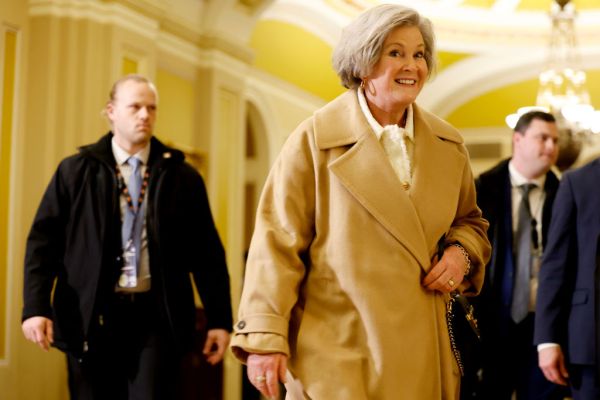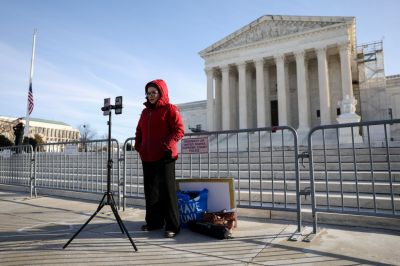Happy Tuesday! Police pulled a coyote from behind the shelves of an Aldi in Chicago, right before it escaped and leapt back there again. We’re very glad the animal kingdom finds Whole Foods prices as outrageous as we do.
Quick Hits: Today’s Top Stories
- Many of President-elect Donald Trump’s top Cabinet picks are slated to appear before Congress this week, with more than a dozen hearings currently scheduled from Tuesday through Thursday. Among the most prominent nominees appearing before Congress are Pete Hegseth (defense secretary) on Tuesday, Marco Rubio (secretary of state) and Pam Bondi (attorney general) both on Wednesday, and Scott Bessent (treasury secretary) on Thursday. With the appointment of a replacement for Vice President-elect J.D. Vance by Ohio Gov. Mike DeWine, a Republican, expected soon, the GOP will enjoy a 53-47 majority in the confirmation battle ahead.
- Wildfires continued to burn in the Los Angeles area on Monday, covering an area of more than 40,000 acres. Firefighters made some progress in containing the blazes, with the two largest fires, the Palisades fire and the Eaton fire, at 14 and 33 percent containment respectively. With high-speed winds expected to pick up again late Monday, the National Weather Service (NWS) issued red flag warnings for parts of Ventura and Los Angeles counties, a rare designation denoting a very high risk of fire spread. “In other words, this setup is about as bad as it gets,” the NWS Los Angeles station posted on X. “Stay aware of your surroundings. Be prepared to evacuate.”
- The daughter of German-Iranian dual national Nahid Taghavi announced Monday that her mother, who had been jailed by Iranian authorities in 2020 and sentenced to 10 years in prison for “disrupting national security” and “spreading propaganda against the system,” had been released. Amnesty International said that Taghavi, 70, suffered injuries and deteriorating mental health at the notorious Evin prison in Iran, where she was kept in solitary confinement. She had been arrested in Tehran in alleged connection to a social media account advocating for women’s rights.
- Citing an official who was briefed on the negotiations, Reuters reported on Monday that after a “breakthrough” in negotiations, Qatari mediators presented Hamas and Israel with a final draft agreement in ongoing ceasefire-for-hostage deal talks. “On the war between Israel and Hamas, we’re on the brink of a proposal that I laid out in detail months ago finally coming to fruition,” said President Joe Biden in a Monday speech touting his foreign policy accomplishments. The deal on the table envisions a ceasefire of at least six weeks and the release of over a thousand Palestinian prisoners and detainees, in exchange for the release of around 33 hostages, living and dead, from Hamas captivity.
- The White House on Monday extended the deadline for Japan’s Nippon Steel to cancel plans to acquire U.S. Steel to mid-June, potentially giving the Japanese company an opening to advance a deal that President Joe Biden blocked on national security grounds. The $14 billion deal—halted earlier this month by the Biden administration, which cited national security concerns—is also opposed by President-elect Donald Trump. But the delay will give courts time to review a legal challenge to the executive order in question, as well as an opportunity to potentially negotiate new terms.
- The Commerce Department announced Monday that it would impose significant export restrictions on computer chips and other components critical for artificial intelligence projects, covering most countries in the world. The regulations impose quotas on the sale of computer chips, known as GPUs, and restrict American companies from sharing the technical details of advanced AI models. The actions are seen as attempts to consolidate American control over emerging technologies, especially in relation to China’s attempts to circumvent export controls and develop its own chip and AI industry.
- U.S. oil prices rose more than 3 percent on Monday—and more than 3.5 percent last Friday—to a five-month high after the Biden administration placed expansive sanctions on Russia at the end of last week. The measures—which targeted 183 shipping vessels, two major Russian producers, and several Russian energy officials—affect a quarter of Russian oil exports and will likely disrupt oil supply in India and China, which could turn to Middle Eastern suppliers. The United Kingdom also imposed sanctions against Russia, as the U.K. and the U.S. work to cut off Russian revenue streams being used to fund the war in Ukraine.
TikTok’s Day in Court

For TikTok’s 170 million American users, the long-dreaded switch to Instagram Reels has never looked more imminent.
That’s at least the impression the Supreme Court left on Friday, during more than two hours of oral arguments in a case challenging the constitutionality of a “TikTok ban” passed by Congress last year. The court’s ruling, which could come as soon as tomorrow, may finally put an end to the popular streaming platform’s yearslong fight to maintain its U.S. operations. So what does that mean for TikTok, an app that managed to entice half of the U.S. population despite mounting security concerns over its parent company’s Chinese ownership?
Arguing on behalf of TikTok Friday, Noel Francisco—former solicitor general under the Trump administration—called the law an attack on “speech itself.” But the majority of the justices appeared inclined to believe the government’s argument that the legislation targeted the Chinese ownership of ByteDance—TikTok’s parent company—not the content that it produced.
The court can now strike down the law, which it doesn’t seem inclined to do; uphold the ban and let it take effect in five days; or delay the law’s implementation by issuing an administrative stay or injunction. The final option could open the door to an intervention by President-elect Donald Trump, who filed an amicus brief in December asking the Supreme Court to pause the law to afford him time to “resolve the dispute through political means.” Despite sharing the Biden administration’s national security concerns about TikTok, the incoming president recently said that he has a “warm spot” for the app and its young user base.
How did we get here? Last spring, Congress passed a bipartisan law after a string of efforts by the government to restrict or ban the app’s use. As we wrote at the time:
The Trump administration attempted to ban the app via executive order in 2020 but was blocked in court, casting doubt on the government’s ability to restrict the app through existing legal authority. The Biden administration reversed the executive order, but allowed the Committee on Foreign Investment in the United States (CFIUS)—an interagency panel that reviews business transactions and investments for potential national security risks—to continue its assessment of TikTok. Last year, CFIUS reportedly threatened to ban the app if it didn’t sever ties with ByteDance.”
Despite facing a looming ban, ByteDance and the U.S. government have been locked in a proverbial game of chicken, with TikTok’s parent company refusing to divest more than a year later. Lawmakers and experts have long argued that the firm is beholden to the Chinese government, creating security risks for the app’s American users.
Among Congress’ concerns is content manipulation which, given TikTok’s large American user base, could give a U.S. adversary the ability to shape public discourse through inorganic means. “The fear on the part of the U.S. government is that 170 million people turn to TikTok as one of their primary sources of both information and entertainment, and within a nanosecond, the Chinese government could ask TikTok parent—ByteDance—to shift the algorithm to show those 170 million people basically whatever they want,” Rita McGrath, the academic director in executive education at Columbia Business School, told TMD.
There’s some evidence that this may already be happening. A study by the Network Contagion Research Institute at Rutgers University found that topics like the Hong Kong protests, Tibet’s territorial dispute with China, and the plight of the Uyghurs are noticeably under-represented on TikTok when compared to its direct competitor, Instagram Reels. The research institute’s founder concluded that it was “not believable” that the phenomenon had happened organically.
Such capabilities may be merely pernicious now, but they would be disastrous in the event of a future geopolitical confrontation involving the U.S. and China. “You can imagine, China and the U.S. get into a war over Taiwan. Suddenly, TikTok is flooded with pro-China, anti-Taiwan propaganda,” Alan Rozenshtein, an associate professor at the University of Minnesota Law School and a former Justice Department lawyer who worked on cybersecurity and foreign intelligence issues, told TMD. “If that’s organic, if that’s what the users think—that’s fine, that’s First Amendment-protected. But what’s not protected is the Chinese government getting to manipulate that algorithm for its own geopolitical ends.”
The government also pointed to concerns surrounding possible data collection on U.S. citizens. The Chinese Communist Party (CCP) has increasingly sought access to the personal data of foreign nationals and TikTok, like all social media companies, has accrued a trove of information. As Justice Brett Kavanaugh pointed out Friday during oral arguments, many of TikTok’s young users are the country’s future law enforcement officers and government officials—and giving Beijing access to their information could risk generating blackmail material for decades to come.
“One thing that people have not talked about at all is the fact that so many of the big U.S.-based platforms are completely banned in China,” McGrath said. “They’ve walled off much of the rest of the world, so you won’t find a lot of American social media companies there. So clearly their government is perfectly capable of saying, ‘This is a potential adversarial situation, and we’re going to make our own policies about who’s allowed to access our citizens.’”
“Congress is fine with the expression,” Chief Justice John Roberts said. “They’re not fine with a foreign adversary, as they’ve determined it is, gathering all this information about the 170 million [Americans] who use TikTok.”
Francisco, representing TikTok, didn’t downplay the national security concerns but argued they could’ve been addressed through other means, such as imposing penalties on servers for data sharing or requiring the app to inform users about its foreign ownership. But the crux of his argument rested on the First Amendment. By forcing a ban or divestiture, the law put a burden on TikTok’s speech, he argued, distinguishing the company from its Chinese-based parent yet tying their fates together and asserting that the U.S. government sought to limit speech it disagreed with.
But most justices seemed to conclude that the law targeted TikTok’s ownership, not its content, rendering the First Amendment appeal irrelevant. “The law doesn’t say TikTok has to shut down,” Justice Amy Coney Barrett said. “It says ByteDance has to divest.”
And in some ways, ByteDance’s refusal to divest from TikTok has reinforced the idea that the company is under the thumb of the CCP. “If it were up to ByteDance, I’m sure they would divest, because better to sell and make some money than to totally have your asset go to zero,” Rozenshtein said. “But it’s ultimately not up to ByteDance. It’s up to the Chinese government.”
So what comes next? If the justices uphold the law without issuing an injunction or administrative stay, app store owners and servers allowing TikTok to operate will face hefty civil penalties beginning Sunday. While this doesn’t mean that the platform will go dark—users will still have the app on their phones, and TikTok can move its servers abroad—it will prevent new users from downloading the app and prevent existing users from updating it, opening the door to glitches and security vulnerabilities.
“Presumably, more and more TikTok users will decide that it’s not worth using the service because it’s a headache, and they’ll instead switch to alternatives,” Rozenshtein said. “And that trickle will become a flood and TikTok will become, one day, as relevant as MySpace or Friendster.”
Worth Your Time
- In The Wall Street Journal, Scott Calvert and Joshua Chaffin explore how online misinformation and AI fabrications tie up much-needed resources in disasters like the Los Angeles fires and the recent New Orleans attack. “Fast-proliferating online falsehoods are forcing public officials nationwide to adopt a new job when crisis strikes their communities. Their duties now include knocking down the inevitable wave of lies, half-truths and conspiracy theories—some wild, some believable—that have of late become part of every major public emergency, from Hurricane Helene to the recent Tesla explosion in Las Vegas,” they wrote. “In New Orleans, authorities struggled with messaging after the New Year’s Day attack there in which a man killed 14 people after plowing into revelers with a pickup. First they declared it wasn’t a terrorist attack, before evidence emerged showing the suspect was inspired by ISIS. They initially said they thought he had accomplices, only to say later that he acted alone. The lesson… isn’t for authorities to stay quiet. To maintain public trust, they must join the discussion, albeit with quality information. ‘Back in the day you could be tight-lipped about something, before cellphone cameras, before social media. And you could close down a crime scene in a sense,’ [Yael Bar tur, former NYPD social media manager] said. ‘You can’t afford to be quiet anymore.’”
- Ahead of Saturday Night Live’s 50th anniversary, Susan Morrison penned a deeply reported profile of producer Lorne Michaels for The New Yorker, exploring Michaels’ success by walking through the show’s storied history. “Cast members and writers have speculated for years about the secret behind Michaels’s extraordinary tenure. ‘It’s him and Hitchcock,’ John Mulaney told me. ‘No one else has had this kind of longevity.’ Half of them think that Michaels has repeatedly been able to remake the show for a new audience because he’s a once-in-a-lifetime talent, a producer nonpareil. The other half wonder whether Michaels, gnomic and almost comically elusive, is a blank screen onto which they’ve all projected their hopes and fears and dark jokes—whether he, like the cramped stages in ‘S.N.L.’’s Studio 8H, is just a backdrop for the ever-shifting brilliance of the country’s best comic minds,” she wrote. “A reader of biographies, [Michaels] keeps a mental list of historical figures whose careers remind him of his own. The roster is not modest. There’s Thomas Edison….Then there’s Shakespeare. The playwright, Michaels likes to note, first had to get his work approved by the Lord Chamberlain and the court—the network bosses of their day…. Shakespeare also wrote expressly for the actors in his company. ‘I know he had a Belushi,’ Michaels told me. ‘That’s why Falstaff appears in three plays.’ Above all, Shakespeare was ‘the ultimate problem solver.’ Like Michaels, the Bard saw to it that, despite any obstacle, the show would go on.”
Presented Without Comment
Associated Press: Country star Carrie Underwood will perform at Trump’s inauguration
Also Presented Without Comment
NBC News: Eagles receiver A.J. Brown was reading a book on the sidelines of team’s playoff win
In the Zeitgeist
When Better Man—a biopic about Robbie Williams—was announced, some wondered whether it could perform well in America, where the British pop star’s popularity never quite caught on like in the United Kingdom. Apparently, it can’t—the film only made $1 million over the weekend in its nationwide release. Williams is also portrayed as a CGI monkey throughout the movie, which probably didn’t help. Reviews, though, have been fantastic—so here’s the trailer in case you want to see it in solidarity with our friends across the pond.
Toeing the Company Line
- In the newsletters: Kevin Williamson argued (🔒) that Donald Trump’s imperialist ambitions are fundamentally unserious, and Nick Catoggio explored (🔒) emerging rifts in the MAGA movement.
- On the podcasts: Sarah Isgur and David French cover the Alito-Trump phone call and new challenges to explicit content age-verification laws on Advisory Opinions.
- On the site: Mike Warren reports on how smoothly the Trump transition has gone in contrast to 2016, John McCormack weighs RFK Jr.’s confirmation odds, and John Gustavsson proposes his alternative to annexing Greenland.
Let Us Know
Do you buy TikTok’s argument that the divest-or-shutter law violates its First Amendment rights?









Please note that we at The Dispatch hold ourselves, our work, and our commenters to a higher standard than other places on the internet. We welcome comments that foster genuine debate or discussion—including comments critical of us or our work—but responses that include ad hominem attacks on fellow Dispatch members or are intended to stoke fear and anger may be moderated.
With your membership, you only have the ability to comment on The Morning Dispatch articles. Consider upgrading to join the conversation everywhere.